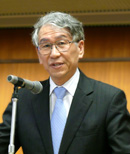| |

Atsuto Suzuki
Director General
|
2009.12.08
The budget allocation process needs improvements
Last month, working groups of the Government Revitalization Unit has made budget allocation recommendations for the next fiscal year. Japanese key science projects were evaluated on the bases of two principles: cut expenditure on wasteful projects and encourage projects beneficial to the general public.
While I fully consent to such necessity, I cannot help but feel that the way the allocations are made has no legitimate basis. Their two principles lack both perspectives and necessary expertise, and are far from being sufficient to bring about reasonable recommendations. I have explained my view in detail below, and strongly hope these matters will be considered seriously as well as what are now widely expressed criticisms. I strongly urge the Government to reconsider their shortcomings, and take corrective measures for the fuller allocation processes.
(1) Need diverse perspectives
The process of creating a national budget requires more than just views of general public and cost reduction. It requires perspectives as a global citizen and as an educator.
Our present social and industrial infrastructures are built upon a century old discoveries in basic sciences. Electronics, computer, semiconductor, laser, nuclear power, and space station are just few examples. No such critical technologies would have resulted if not for the efforts and resources put in the fields of basic science.
Looking ahead, Asia will emerge as a leading contributor to the development of science and technology around the globe. Being the central player in Asia, Japan's withdrawal will impact globally. It is critical that Japan continues to thrive in basic science in Asia, and around the world. What Japan needs is to develop perspective as a global citizen.
Furthermore, the concept of cost reduction can cause dangerous consequence when brought to extreme. In recent years, the manufacturing industry has transferred production to low-labor-cost counties as a part of cost reduction measure. This has caused the hollowing-out of industry in Japan, and its tradition of 'monozukuri' (shop-floor) craftsmanship is now of the past. From the point of view of science, however, the consequence will be more profound.
I believe this is where decision-making requires the perspective as an educator. We must invest in our future. Promotion of science and technology is as critical as promotion of education. We ought to advance science and technology to nurture the dreams and hopes of our young generations. One major discovery out of those hundreds of research institutions in Japan can bring about dramatic advances in science and technology in the world. The nation's pride, hope, and success are driven by this perspective.
(2) Need expertise
One of the most serious flaws I have noticed in the budget allocation process is that the evaluations of the projects in question were based on insufficient information. KEK, as an inter-university research organization, received a low mark on the item 'special educational research expense'. I saw the entire live stream on the web on this issue, and know that there was only one question asked on the item during the interview with the Ministry officials. One working group reviewer asked, "What expense is this?" to which the Ministry answered, "It is a research expense for projects like Subaru and Super-Kamiokande." Later I leaned that two reviewers gave "as requested," six gave "cut", and the other six gave "revoke". There was no explanation for their decisions.
The special educational research expense is used for operation, maintenance, management of research facilities and equipments for inter-university research projects. The numerous findings in frontline particle physics, nuclear physics, material science, and biological science, and the development of frontier technologies are the results of the work funded by the special educational research expense. Without the funding to run our machine, the experimental confirmation of the Nobel Prize-winning work by Kobayashi and Maskawa would not have been possible. In addition, graduate students write 40 to 50 doctoral dissertations, and around 80 master's theses every year on their work at KEK, funded by the special educational research expense.
I would like to ask the reviewers whether they had at all considered the eventual consequence of their recommendations. Hopefully, this illustrated well how important the experts' inputs are. What we ask for is simply a chance to explain what is necessary to make well-informed decision, whether for or against.
Thank you very much for your kind attention.
Atsuto Suzuki, KEK Director General
|



